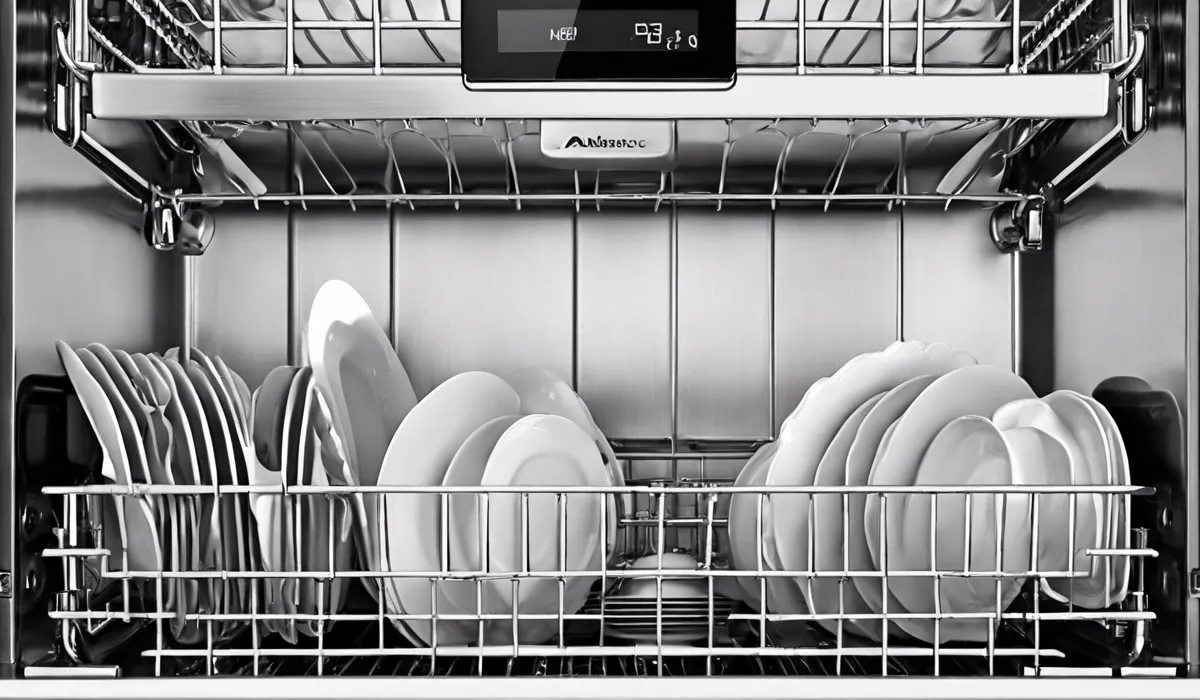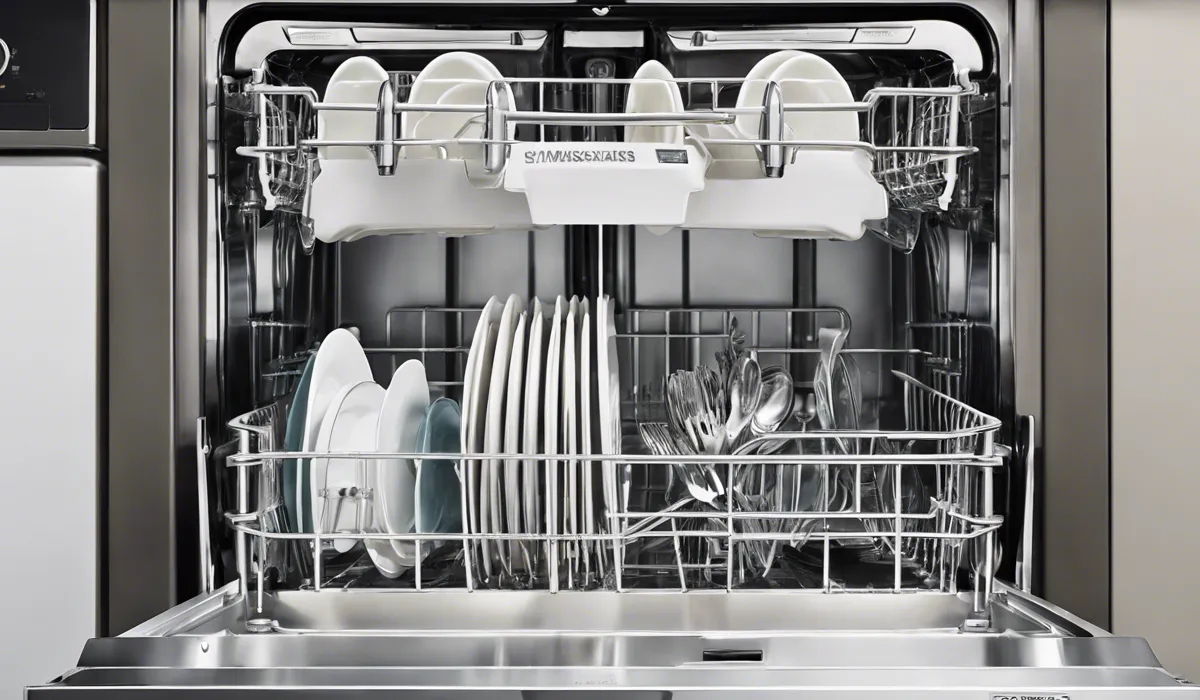Do Dishwashers Really Clean Dishes? Debunking Myths
Yes, dishwashers effectively clean dishes using hot water and detergent. They are designed to remove food residues, sanitize dishes, and save water compared to hand washing. For best results, scrape off large food particles before loading.
Dishwasher Cleaning Mechanism

How Dishwashers Clean
Dishwashers clean dishes through a combination of water spray, detergent, and heat. Inside a dishwasher, rotating spray arms shoot hot water mixed with detergent onto the dirty dishes.
The force of the water, along with the cleaning properties of the detergent, works to break down and remove food particles and grease. After the wash cycle, a rinse cycle follows, using fresh water to remove any remaining detergent and debris.
Water Temperature’s Role in Cleaning
The effectiveness of a dishwasher largely depends on the water temperature. Hot water not only helps to dissolve grease but also sanitizes the dishes.
Most dishwashers have a heating element to raise the water temperature to around 120-160 degrees Fahrenheit, which is the optimal range for cleaning and sanitization.
Efficiency and Effectiveness Compared to Hand Washing
When comparing dishwashers to hand washing, dishwashers often come out ahead in both efficiency and effectiveness.
Dishwashers can clean a full load of dishes with a fraction of the water and effort it would take to wash them by hand.
They are especially efficient at sanitizing dishes as they can maintain higher water temperatures for longer periods than hand washing typically does.
Detergents and Rinse Aids
Detergents designed for dishwashers contain enzymes that break down food residues, while rinse aids help water to sheet off dishes to prevent spots and streaks.
These products are formulated to work with the mechanics of a dishwasher, ensuring that dishes come out clean and dry.
Factors Influencing Dishwasher Cleaning Performance

Loading Techniques and Outcomes
The way dishes are loaded into the dishwasher can significantly impact cleaning performance.
Overloading the dishwasher or blocking the spray arms can prevent water from reaching all surfaces. It is important to place dishes in such a way that the water and detergent can circulate freely, which means not nesting dishes or laying them flat.
Selecting the Correct Cycle
Modern dishwashers offer a variety of cycles for different types of dish loads. Choosing the right cycle is important for both cleaning and energy efficiency.
For example, a heavy-duty cycle is best for pots and pans, while a light wash might suffice for a load of glasses and plates.
Hard Water and Dish Cleanliness
Hard water contains high levels of minerals like calcium and magnesium, which can leave deposits on dishes and the dishwasher’s interior.
These deposits can affect cleaning performance. Using a water softener or adding a dishwasher salt can help mitigate the effects of hard water.
Maintenance and Cleaning of the Dishwasher
Regular maintenance and cleaning of the dishwasher are crucial for optimal performance. This includes cleaning the filter, checking the spray arms for clogs, and using a dishwasher cleaner to remove any grease and limescale buildup.
Comparing Dishwasher to Hand Washing in Terms of Cleanliness

Bacteria and Virus Removal Studies
Scientific studies have shown that dishwashers can remove more bacteria and viruses than hand washing due to the higher temperatures and longer exposure times.
The sanitation cycle on many dishwashers is specifically designed to kill germs, offering a level of cleanliness that is difficult to achieve with hand washing.
Energy and Water Usage Analysis
Energy and water usage are lower in dishwashers compared to hand washing when washing full loads. This is because dishwashers use hot water more efficiently and recycle the water during the wash and rinse cycles.
Environmental Considerations
Dishwashers have an environmental edge as they often use less water and energy per dish than hand washing.
Additionally, the wastewater from dishwashers is more likely to contain less soap due to the precise amount of detergent used, which is better for the environment.
Human Error vs. Dishwasher Consistency
Human error in hand washing can lead to inconsistency in cleanliness and sanitization.
In contrast, dishwashers offer a consistent clean, as long as they are loaded correctly and maintained. This consistency helps ensure that every load of dishes is cleaned to the same standard.
FAQs About Dishwasher Cleaning Efficacy
Do dishwashers really get dishes clean?
Yes, dishwashers are designed to effectively clean dishes by using hot water and detergent to remove food residues and sanitize them.
Are dishes sanitized after being washed in a dishwasher?
Yes, the high temperatures reached during the dishwasher’s cycle are capable of sanitizing dishes.
Is pre-rinsing necessary before loading dishes into a dishwasher?
No, pre-rinsing is not necessary, but scraping off large food particles is recommended for the best cleaning results.
Can a dishwasher save water compared to hand washing dishes?
Yes, dishwashers can save water as they are more efficient in water usage compared to hand washing dishes.
What type of detergent should be used in a dishwasher?
Use detergents specifically designed for dishwashers to achieve the best cleaning and sanitizing results.
Final Thoughts
Dishwashers are efficient at cleaning dishes by using high-temperature water and detergent to remove food residues and sanitize.
They also conserve more water than washing by hand. However, it’s recommended to pre-scrape large food particles to optimize the cleaning process and ensure the best hygiene.





